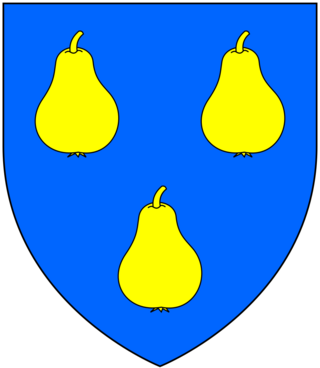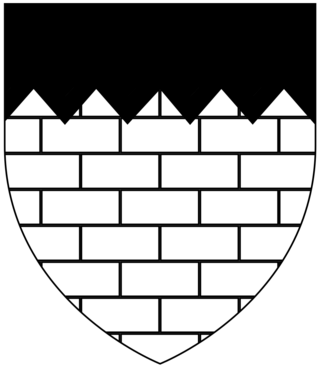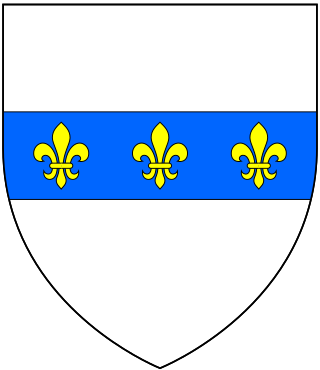
Walter Hungerford, 1st Baron Hungerford was an English knight and landowner, from 1400 to 1414 a Member of the House of Commons, of which he became Speaker, then was an Admiral and peer.
Boconnoc is a civil parish in Cornwall, England, United Kingdom, approximately four miles (6 km) east of the town of Lostwithiel. According to the 2011 census the parish had a population of 96.

John Hawley of Dartmouth in Devon, was a wealthy ship owner who served fourteen times as Mayor of Dartmouth and was elected four times as a Member of Parliament for Dartmouth. He is reputed to have been the inspiration for Chaucer's "schipman". His magnificent monumental brass survives in St Saviour's Church, Dartmouth.
Sir Walter Beauchamp was an English lawyer who was Speaker of the House of Commons of England between March and May 1416.
Margaret Grey was a Cambro-Norman noblewoman, the daughter of Reginald Grey, 3rd Baron Grey de Ruthyn, a powerful Welsh Marcher Lord, who was the implacable enemy of Owain Glyndŵr.

Sir Maurice Russell, JP of Kingston Russell, Dorset and Dyrham, Glos. was an English gentleman and knight. He was a prominent member of the Gloucestershire gentry. He was the third but eldest surviving son and heir of Sir Ralph Russell (1319–1375) and his wife Alice. He was knighted between June and December 1385 and served twice as Knight of the Shire for Gloucestershire in 1402 and 1404. He held the post of Sheriff of Gloucestershire four times, and was Coroner and Justice of the Peace, Tax Collector and Commissioner of Enquiry. His land holdings were extensive in Gloucestershire, Somerset, Dorset, Berkshire and Buckinghamshire. He was descended from an ancient line which can be traced back to 1210, which ended on the death of his son Thomas, from his second marriage, as a young man without male issue. Most of his estates, despite having been entailed, passed at his death into the families of his two daughters from his first marriage.

Sir Philip Courtenay, of Powderham, Devon was the fifth son of Hugh Courtenay, 10th Earl of Devon (1303–1377). He was the founder of the cadet dynasty known as "Courtenay of Powderham", seated at the manor of Powderham, until then a former Bohun manor of little importance, whilst the line descended from his elder brother, the Earls of Devon of the mediaeval era, continued to be seated at Tiverton Castle and Okehampton.

Sir Hugh I Courtenay, of Haccombe in Devon, was Sheriff of Devon for 1418/19 and was thrice elected knight of the shire for Devon in 1395, 1397 and 1421. He was a grandson of Hugh de Courtenay, 2nd/10th Earl of Devon (1303–1377), was the younger brother of Edward de Courtenay, 3rd/11th Earl of Devon (1357–1419), "The Blind Earl", and was the grandfather of Edward Courtenay, 1st Earl of Devon (d.1509), KG, created Earl of Devon in 1485 by King Henry VII. He was the link between the senior line of the Courtenay Earls of Devon made extinct following the Battle of Tewkesbury in 1471 and the post-Wars of the Roses creation of a new Earldom for his grandson made in 1485 by King Henry VII.
William Haute (1390–1462) of Bishopsbourne, Kent, was an English politician.

Sir John Chichester (1519/20-1569) of Raleigh in the parish of Pilton, near Barnstaple in North Devon, was a leading member of the Devonshire gentry, a naval captain, and ardent Protestant who served as Sheriff of Devon in 1550-1551, and as Knight of the Shire for Devon in 1547, April 1554, and 1563, and as Member of Parliament for Barnstaple in 1559, over which borough his lordship of the manor of Raleigh, Pilton had considerable influence.

Sir Robert Cary of Cockington, Devon, was twelve times Member of Parliament for Devon, in 1407, 1410, 1411, May 1413, April 1414, Mar. 1416, 1417, 1419, May 1421, 1422, 1425 and 1426. Much of his later life was devoted to regaining the many estates and other landholdings forfeited to the crown following his father's attainder in 1388. He was an esquire in the households of King Richard II (1377–1399) and of the latter's half-brother John Holland, 1st Duke of Exeter.

Sir Philip Cary of Cockington, Devon, was Member of Parliament for Devon in 1433.

Nicholas Radford of Upcott in the parish of Cheriton Fitzpaine, and of Poughill, Devon, was a prominent lawyer in the Westcountry who served as Member of Parliament for Lyme Regis, Dorset and Devon (1435). During the anarchic times of the Wars of the Roses he was caught up in the dynastic Westcountry rivalry between Thomas de Courtenay, 5th Earl of Devon, of Tiverton Castle, for whom during his minority he had acted as steward, and William Bonville, 1st Baron Bonville, of Shute. His murder in 1455 by the Earl's faction "ranks among the most notorious crimes of the century", and was the precursor of the Battle of Clyst Heath (1455) fought shortly thereafter near Exeter by the private armies of the two magnates. He served as a Justice of the Peace for Devon (1424-1455), as Escheator for Devon and Cornwall (1435-6), Recorder of Exeter (1442-1455) and as Tax Collector for Devon in 1450 and as Apprentice-at-law for the Duchy of Lancaster (1439-1455).

Richard Stucley, of Merston and Chewton Mendip, was an English landowner, administrator and politician who married an heiress and through his son Hugh, who also married an heiress, became the ancestor of a major Devon family.

Walter Reynell was an English landowner, soldier, administrator and politician who sat as Member of Parliament for Devon in 1404.
Sir Robert Chalons was an English courtier, soldier, administrator and politician from Devon.
John Copplestone of Copplestone in Colebrooke, Devon was an English Member of Parliament.

Sir Gerard de Usflete, (c.1346-1406) of North Ferriby and Ousefleet, Yorkshire, was a Member of Parliament for Yorkshire in 1401.
Edward Guildford (c1390-1449) was an English landowner, administrator, and politician from the county of Kent who served three times as its MP and once as its Sheriff.
Sir Richard Champernowne (1344-1419) was an English landowner and administrator who held lands at Modbury, Dodbrooke, Bridford, and East Portlemouth in Devon and at Aston Rowant in Oxfordshire.













